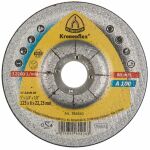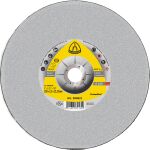Abrasives are hard, dense materials, either natural or synthetic, used to shape other materials by removing parts of them. They are commonly used for polishing and other applications, and their effectiveness depends on their hardness.
At Engweld, we provide a large range of abrasives from world-leading manufacturers including Klingspor, Abracs and 3M while we also supply our own RADNOR™ range of high-quality cutting and grinding discs at very competitive prices. The major part of our abrasives products including Klingspor and our own brand are OSA-approved to ensure the highest quality and security possible.
We offer a full range of abrasives, supplying everything from flap discs, grinding discs and cutting discs, to abrasive belts like sanding belts, plus abrasive rolls and flap wheels. Cutting, grinding and polishing essentials have never been so easy to come by.
The use of abrasive products is widespread amongst numerous industries, not least in any industry in which welding is common practice. Any time that any metals are welded together, there are burrs created at the point at which the metal is joined. These burrs protrude from the surface of the metals, and in order to remove them, abrasives for metal are used.
Abrasives FAQs
Do abrasives have an expiration date?
Resin bonded abrasive products should be used within 2 years of the manufacturing date. With proper storage in a dry area, away from solvents and extreme temperatures, they may last longer. Always inspect older products before use, and consider professional inspection or speed testing. Use older wheels first.
Do I need to use a guard with a coated abrasive?
If your tool comes equipped with a guard, then yes, you need to use the guard when the machine is in use. You should never remove the guard from a machine that comes equipped with one for any reason as mentioned in the ANSI B7.7, Safety Requirements for Abrading Materials with Coated Abrasive Systems, states.
Do I need to wear any special personal protective equipment (PPE) when using abrasive products?
When using abrasive products, it is crucial to wear appropriate PPE, including:
Avoid loose clothing, jewellery, and ensure long hair is tied up.





































